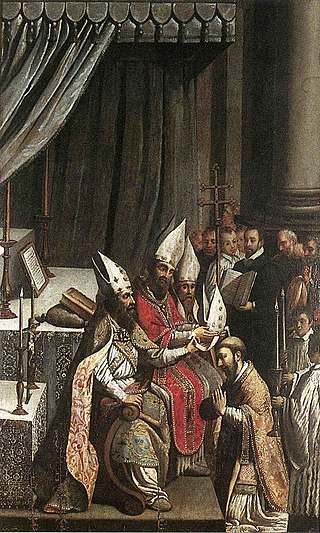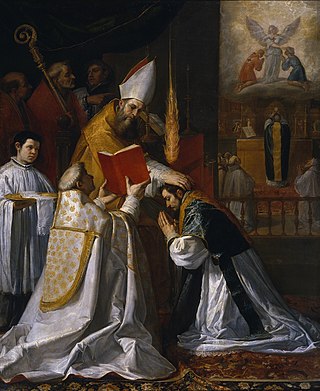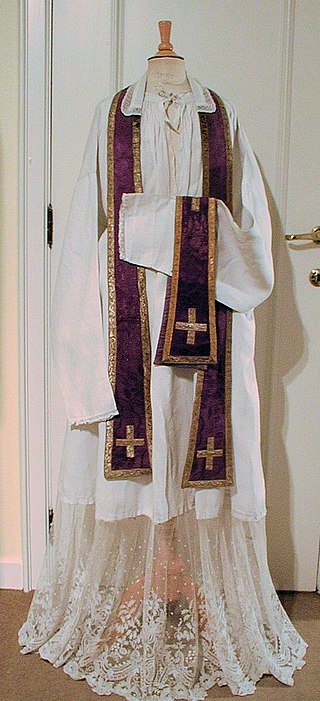Ordination is the process of consecrating clergy.
Ordination may also refer to:
- Ordination (statistics), a multivariate statistical analysis procedure
- Ordination (1640), a painting in Nicolas Poussin's first Seven Sacraments series
Ordination is the process of consecrating clergy.
Ordination may also refer to:

Apostolic succession is the method whereby the ministry of the Christian Church is considered by some Christian denominations to be derived from the apostles by a continuous succession, which has usually been associated with a claim that the succession is through a series of bishops. Those of the Catholic, Eastern Orthodox, Scandinavian Lutheran, Anglican, Oriental Orthodox, Church of the East, Hussite, Moravian and Old Catholic traditions maintain that "a bishop cannot have regular or valid orders unless he has been consecrated in this apostolic succession". These traditions do not always consider the episcopal consecrations of all of the other traditions as valid.

In certain Christian denominations, holy orders are the ordained ministries of bishop, priest (presbyter), and deacon, and the sacrament or rite by which candidates are ordained to those orders. Churches recognizing these orders include the Catholic Church, the Eastern Orthodox, Oriental Orthodox, Anglican, Assyrian, Old Catholic, Independent Catholic and some Lutheran churches. Except for Lutherans and some Anglicans, these churches regard ordination as a sacrament.
Bot or BOT may refer to:
Ministry may refer to:

Ordination is the process by which individuals are consecrated, that is, set apart and elevated from the laity class to the clergy, who are thus then authorized to perform various religious rites and ceremonies. The process and ceremonies of ordination vary by religion and denomination. One who is in preparation for, or who is undergoing the process of ordination is sometimes called an ordinand. The liturgy used at an ordination is commonly found in a book known as an Ordinal which provides the ordo for celebrations.
Defrocking, unfrocking, degradation, or laicization of clergy is the removal of their rights to exercise the functions of the ordained ministry. It may be grounded on criminal convictions, disciplinary problems, or disagreements over doctrine or dogma, but may also be done at their request for personal reasons, such as running for civil office, taking over a family business, declining health or old age, desire to marry against the rules for clergy in a particular church, or an unresolved dispute. The form of the procedure varies according to the Christian denomination concerned.
Clerical celibacy is the requirement in certain religions that some or all members of the clergy be unmarried. Clerical celibacy also requires abstention from deliberately indulging in sexual thoughts and behavior outside of marriage, because these impulses are regarded as sinful. Vows of celibacy are generally required for monks and nuns in Christianity, Buddhism, Hinduism, Jainism and other religions, but often not for other clergy.

The ordination of women to ministerial or priestly office is an increasingly common practice among some contemporary major religious groups. It remains a controversial issue in certain religious groups in which ordination was traditionally reserved for men.

The stole is a liturgical vestment of various Christian denominations, which symbolizes priestly authority; in Protestant denominations which do not have priests but use stoles as a liturgical vestment, however, it symbolizes being a member of the ordained. It consists of a band of colored cloth, usually of silk, about seven and a half to nine feet long and three to four inches wide, whose ends may be straight or may broaden out in the shape of a spade or bell. The center of the stole is worn around the back of the neck and the two ends hang down parallel to each other in front, either attached to each other or hanging loose. The stole is almost always decorated in some way, usually with two crosses, or sometimes another significant religious design. It is often decorated with contrasting galloons and fringe is usually applied to the ends of the stole following Numbers 15:38–39. A piece of white linen or lace may be stitched onto the back of the collar as a sweat guard, which can be replaced more cheaply than the stole itself.
For graduate-level theological institutions, the Master of Divinity is the first professional degree of the pastoral profession in North America. It is the most common academic degree in seminaries and divinity schools.

Consecration is the transfer of a person or a thing to the sacred sphere for a special purpose or service. The word consecration literally means "association with the sacred". Persons, places, or things can be consecrated, and the term is used in various ways by different groups. The origin of the word comes from the Latin stem consecrat, which means dedicated, devoted, and sacred. A synonym for consecration is sanctification; its antonym is desecration.
Ordination or gradient analysis, in multivariate analysis, is a method complementary to data clustering, and used mainly in exploratory data analysis. In contrast to cluster analysis, ordination orders quantities in a latent space. In the ordination space, quantities that are near each other share attributes, and dissimilar objects are farther from each other. Such relationships between the objects, on each of several axes or latent variables, are then characterized numerically and/or graphically in a biplot.

Buddhist monasticism is one of the earliest surviving forms of organized monasticism and one of the fundamental institutions of Buddhism. Monks and nuns, called bhikkhu and bhikkhuni, are responsible for the preservation and dissemination of the Buddha's teaching and the guidance of Buddhist lay people. Three surviving traditions of monastic discipline (Vinaya), govern modern monastic life in different regional traditions: Theravada, Dharmaguptaka, and Mulasarvastivada.

The sacrament of holy orders in the Catholic Church includes three orders: bishops, priests, and deacons, in decreasing order of rank, collectively comprising the clergy. In the phrase "holy orders", the word "holy" means "set apart for a sacred purpose". The word "order" designates an established civil body or corporation with a hierarchy, and ordination means legal incorporation into an order. In context, therefore, a group with a hierarchical structure that is set apart for ministry in the Church.

The priesthood is the office of the ministers of religion, who have been commissioned ("ordained") with the Holy orders of the Catholic Church. Technically, bishops are a priestly order as well; however, in layman's terms priest refers only to presbyters and pastors. The church's doctrine also sometimes refers to all baptised (lay) members as the "common priesthood", which can be confused with the ministerial priesthood of the consecrated clergy.
Ordination of LGBT clergy may refer to:

The ordination of women in the Anglican Communion has been increasingly common in certain provinces since the 1970s. Several provinces, however, and certain dioceses within otherwise ordaining provinces, continue to ordain only men. Disputes over the ordination of women have contributed to the establishment and growth of progressive tendencies, such as the Anglican realignment and Continuing Anglican movements.
Methodist views on the ordination of women in the rite of holy orders are diverse.

A bhikkhunī or bhikṣuṇī is a Buddhist nun, fully ordained female in Buddhist monasticism. Bhikkhunis live by the Vinaya, a set of either 311 Theravada, 348 Dharmaguptaka, or 364 Mulasarvastivada school rules. Until recently, the lineages of female monastics only remained in Mahayana Buddhism and thus were prevalent in countries such as China, Korea, Taiwan, Japan, and Vietnam, while a few women have taken the full monastic vows in the Theravada and Vajrayana schools. The official lineage of Tibetan Buddhist bhikkhunis recommenced on 23 June 2022 in Bhutan when 144 nuns were fully ordained.

The Universal Life Church (ULC) is an American non-denominational religious organization founded in 1962 by Kirby J. Hensley, under the doctrine: "Do that which is right". The Universal Life Church advocates for religious freedom, offering legal ordination to become a minister free of charge, to anyone who wishes to join. The ULC has ordained ministers from a wide range of backgrounds and beliefs, including atheists, Christians, Jews, Neopagans, Wiccans, and people of many other faiths.